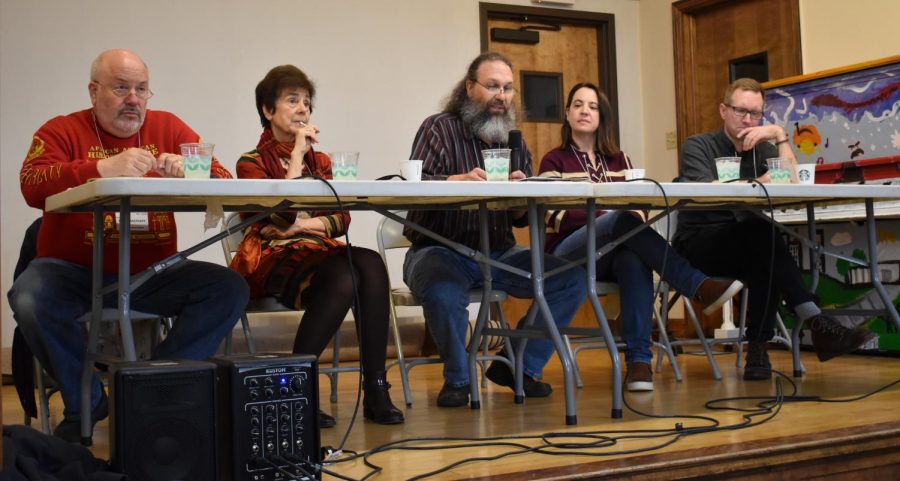Adjuncts assemble for EDex
A panel of educators from the area come together to speak about adjunct faculty and the exile of higher education.
Twin Cities adjunct faculty spoke to an audience at Hamline Public Library on April 27. Pictured from left are Peter Rachleff, Catherine Guisan, David Weiss, Mary Pogatshnik, and Travis Sands.
May 1, 2019
In the basement of the Hamline Public Library on Saturday, April 27, educators of the Twin Cities area gathered for EDex. The event featured a panel of 5 educators from the area, including Peter Rachleff, Mary Pogatshnik, Catherine Guisan, Travis Sands, and David Weiss.
The event started off with opening remarks and a recap on Hamline’s current adjunct negotiations by steward of the Hamline Adjunct Faculty Union SEIU Local 284 and Adjunct Instructor at Hamline University, David Weiss. He touched on three main issues that have been prevalent throughout the bargaining process, economic justice, access to services, and embracing a true partnership with the university.
“In our experience, the administration has been wantonly callous toward the ideals of mutual respect and collaborative partnership that are expressed in the contract itself,” Weiss said.
Following Weiss’ remarks, Labor historian, Co-Executive Director of East Side Freedom Library, and former Macalester professor, Peter Rachleff, provided a broad historical perspective on labor practices and how those in power “put the burden on the backs of workers.”
After learning about neoliberalism from Rachleff, Catherine Guisan, Chair of the American Political Science Association Committee on the Status of Contingent Faculty and a Visiting Associate Professor at the University of Minnesota, took the microphone. She iterated the point that “diversity is in” and that “contingent faculty” need to be recognized as a diversity category.
Guisan recently spoke at a conference at the U of M about diversity in faculty, sponsored by the diversity office.
“We have lots of troubles you have heard about, we belong in this category,” said Guisan. “[The panel] was focused on faculty of color, LGBTQIA+, all of the normal categories, but for the first time, there was a panel of contingent faculty,” Guisan said.
Mary Pogatshnik, Executive Council for AAUP-Minnesota Conference and Instructional Faculty at the University of Minnesota, works on a contingent contract. This means that her position has to be renewed every year.
“[University of Minnesota professors] tried to unify, non-tenured track people, like me, and tenured track people wanted to be in the same unit and bargain together for our interests, our community of interests, which really is our students,” Pogatshnik said. “Because as we all know, teaching conditions are learning conditions, which translate into living conditions.”
The last panelist to talk was Sands, who discussed how today’s university’s “position and discipline students as consumers,” which follows a critique of Hamline that has been prevalent within adjunct discussions that Hamline is operating like a business, not a place of learning.
“They talk about innovation, but [universities] are one of the least innovative spaces,” Sands said.
Some Hamline students were surprised to have not heard anything about the adjunct situation before the EDex event.
“It’s interesting that this is an issue that students aren’t hearing about,” junior Alayna Baggenstoss said. “I think it’s a really important issue that we need to know about because students are the school population. If students know about this, are getting angry, and having opinions about this, those need to be heard.”
The specifics of what the administration wants to include in the new contract, such as losing access to email accounts at the end of the semester, was a concern for sophomore Mary Wiertelak.
“I don’t know who are adjuncts are, unless they actively talk about it, and a lot of people don’t,” Wiertelak said. “I know one of the professors on the bargaining committee. But now it’s like, okay, I can’t email her over the summer if I have a question about something. That affects how I’m going to operate in the future and my longevity and success in my department if I can’t access them easily.”
Guisan, at the end of the event, urged the point that “it’s very important to not treat people as enemies.” She encourages all faculty to come together and support one another, and for the administration and faculty to also respect each other throughout the process as the common goal should be to benefit the students.
Monday, April 29, another bargaining session will be taking place, where there is potential for the two sides to reach an agreement. Following this on Thursday, May 2 from 11:55 a.m. to 12:35 p.m., the Inter Faculty Organization of the Minnesota State System is holding an informational picket on the sidewalk by the Bishop statue to spread the word.
For more information, reference the previous Oracle article “Adjuncts attempt to adjust” or the recent Star Tribune article “Adjunct professors unionize at 3 private colleges in Minn.”

